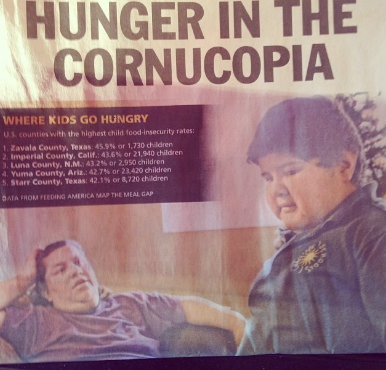"What's the traditional food of Honduras?" I asked our host as soon as I landed in the country. Being a foodie, I was pretty excited about trying a new cuisine. But as we pulled into the town center, it looked to be difficult to find this authentic meal: Lining each side of the roadway, my options were Burger King, Wendy's, Popeyes, and even an Applebees for the fancy occasion. Sadly, this wasn't new to me; on my other trips in the field I noticed fast food on every corner, and one time in India I was even grateful to dine at a KFC amidst a week of eating nothing but curry and desperate for something familiar. My job at Kitechild puts me mainly in contact with low-income populations who could never really afford eating at KFC; even their $8 family value pack would be about a week's wages depending on the country. On my last two trips I made an effort to visit these fast food joints, mainly out of curiosity, but sometimes because I had no other options. At the risk of overgeneralizing, I noticed that many of the regular patrons were what the WHO would consider obese, leading me to wonder about the correlation between expanding fast food markets and obesity in developing countries plagued by food scarcity and malnutrition. People are dying of heart attacks in the same hospital where children die of malnutrition or TB. How?
Processed food companies are set up to target the appetites of populations in developing countries, which they term "emerging markets." The locals are buying into a notion of a Western ideal, into an idea that eating at fast food joints is "cool," and even anthropological research shows the act is often associated with status. Companies simultaneously cater to local food traditions, meaning you can get spicy curry with your happy meal in India and steamed dumplings as a side dish in China. Meanwhile, all my friends talk about back in California are kale and the latest pressed juice combinations, and they wouldn't dare step foot in a McDonald's, as we Americans are more aware of processed foods and their effects on our health. Some may argue that healthy food is a product of privilege -- chicken nuggets can be more affordable than kale. But is it privilege, or lack of awareness? Nobody in these emerging markets is marketing veggies as cool and hip, so how are consumers supposed to make healthy choices when they lack the educational tools to do so? Furthermore, how is it that there is such high obesity rates in these emerging markets as well as high rates of malnutrition?
Fast food marketed as a luxury in India
Take South Africa, for example, a country where 60 percent of women and 25 percent of school children are overweight, yet 20 percent of all children suffer from malnutrition. Even in our own backyard, a recent front page article on USA Today discussed hunger in the states, with an accompanying cover photo of an obese mother and child -- a tad ironic, to say the least. What is it with these paradoxes? Those that are able to afford fast food are perhaps simply unaware of the low nutrient value, and are more concerned with quantity over quality. A full tummy is not necessarily indicative of a healthy tummy. As South African Minister of Health Dr. Aaron Motsoaledit told the Guardian, '"When I was a medical student under apartheid, heart attacks were a rare thing for black people. The main illnesses then were TB, malaria and kwashiorkor [malnutrition from protein deficiency]. That's no longer true. Africans are eating more and more junk processed foods instead of their traditional diet."
The existence of obesity and hunger
But, by writing this article, how is a mother in Nairobi or a father in Chennai going to think twice about healthy food alternatives -- assuming for the moment that they even have alternatives? How are exploited populations going to become aware of the life-threatening dangers of processed food? How will they correlate these foods with conditions such as diabetes and heart disease when they are constantly lured by the glossy adverts of french fries and pizza slices?
It's comes down to education through awareness. "Raising awareness" is often seen as a cop out term for campaigns that generate little impact, as the outcomes of awareness efforts are not always tangible. But this is a case where enlightening people towards the negative effects of cheap, processed food -- no matter how convenient or cool they may seem -- can be effective in changing perceptions and eating habits, and eventually, saving lives. I'll admit that until a couple years ago, I didn't think it was a big deal to order a chicken sandwich at McDonald's. It wasn't until I moved to health-conscious LA, where I was bombarded with healthy living campaigns at my university, that I realized maybe that stuff wasn't so good. Even though it was fast, easy, and at that time, yummy, I started to listen to how my body felt after every nugget: Bloated. Tired. Blegh. I was full, but I wasn't receiving any of the nutrients my body needed. Nowadays I don't crave chicken nuggets or cheesy fries (although it's often difficult to say no to In-n-Out).
Are veggie campaigns the way to fight back?
Fast food companies are rapidly expanding from the Western world because of what they call "saturated markets." I'd say what they are really up against are "educated markets," and it's paramount that our educated awareness spread globally so everyone has the power to make healthy choices. Organizations such as the American Heart Association are gearing up to spread awareness about heart disease and how the disease is tied to obesity, diabetes, and other lifestyle factors that are heavily correlated to the foods we eat. There's also the British Heart Foundation, which generates buzz about healthy living in Great Britain, but who is spreading awareness in Guatemala? In India? In South Africa? Can we have a World Heart Association, given that our processed foods are infiltrating small pockets around the world?
At the end of the day, people are free to make their own choices regarding what they eat. But fast food corporations who power marketing firms with millions of dollars are certainly at the advantage -- unless we're able to fight back with knowledge. Supporting awareness initiatives like the AHA 's Go Red Campaign encourage people to make healthy eating choices in order to avoid lifestyle diseases such as diabetes and high blood pressure. This is one way we can start enlightening others, but lets also spread this around the world. Raising awareness of healthy food (or the detrimental health effects of processed foods) in developing countries is an enormous challenge. I wish I had the answers to just how it can be done, but for now all I can do is hope that by raising the questions, maybe, just maybe, a dialogue can somehow produce solutions.
For ideas about channeling healthy-living campaigns to developing countries, tweet me @jacquelinelala to build momentum!


